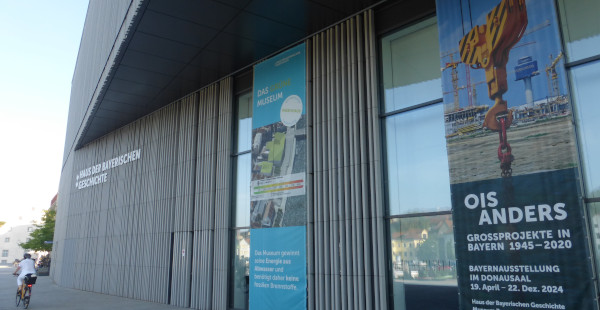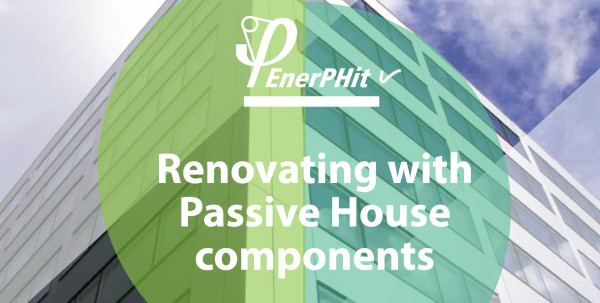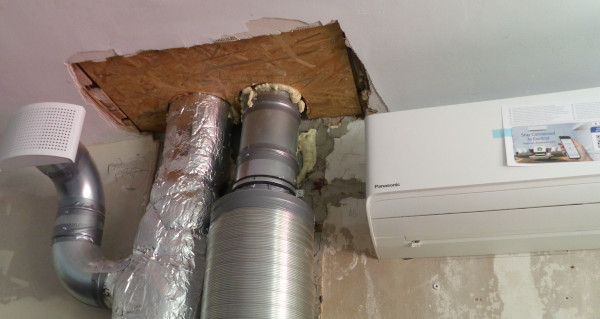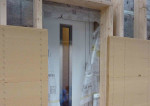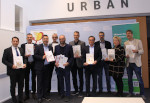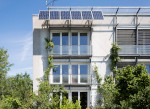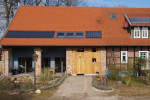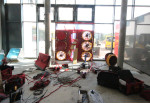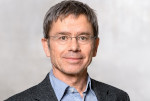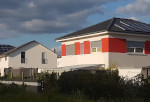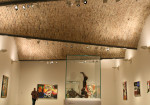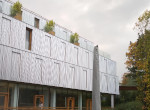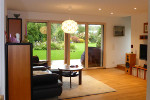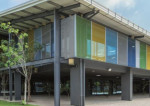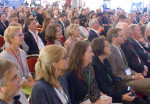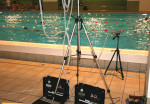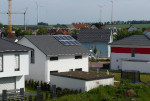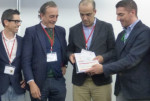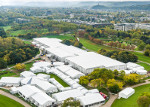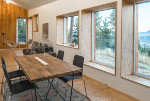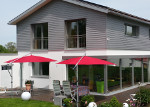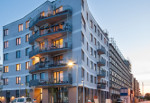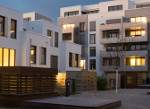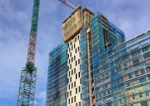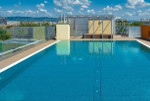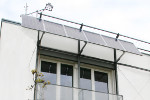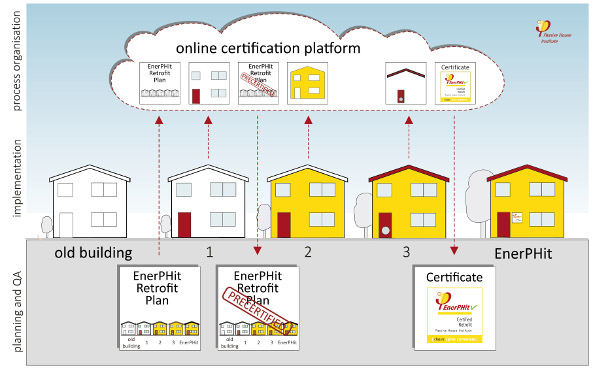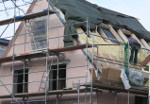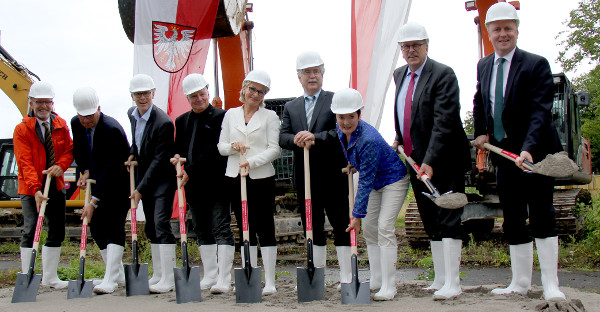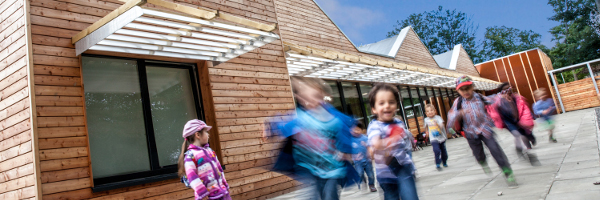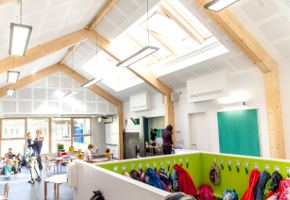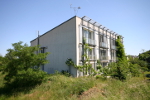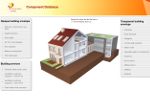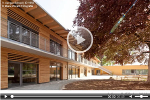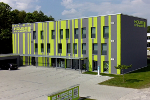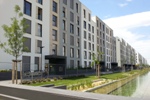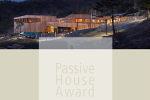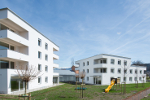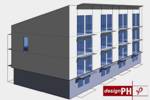The Passive House Institute (PHI) is an independent research institute that has played an especially crucial role
in the development of the Passive House concept - the only internationally recognised, performance-based energy standard in construction. Learn more about the Institute and its work.
Press Releases
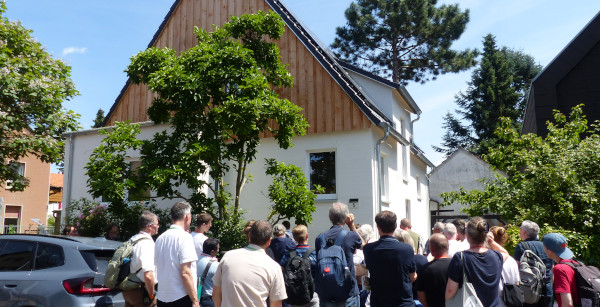
© Passive House Institute |
Amazed by the new indoor climate At the 'Smart Retrofitting' event in Darmstadt, Germany, the building owners described the entirely different kind of living comfort as 'incredible'. Now, noise also remains outside. Over 40 energy consultants accepted the invitation to the 'Passive House on Tour' kick-off event and listened intently as the family reported on the positive changes in their energy-efficient home retrofit. The aim of the new 'Passive House on Tour' series is to present highly energy-efficient projects in theory as well as in practice and to support the implementation of a high level of energy efficiency on site. more |
![]()
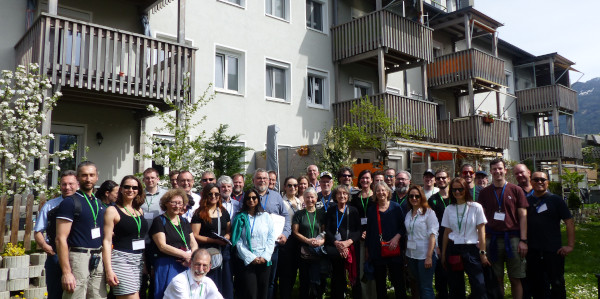
© Passive House Institute |
Energy retrofits work. Really well. "It's the existing buildings that matter!" From the start of the 27th International Passive House Conference in Innsbruck, the Passive House Institute emphasised the importance of highly energy-efficient renovations for climate protection. Diana Ürge-Vorsatz from the IPCC also called for renovations and new builds to focus exclusively on high energy efficiency. The international speakers presented successful projects and showed solutions for unusual challenges such as special climatic conditions or monument protection. The Passive House exhibition, evening events, workshops and four excursions rounded off the conference with the focus: "Retrofit. Have an impact". more |
![]()
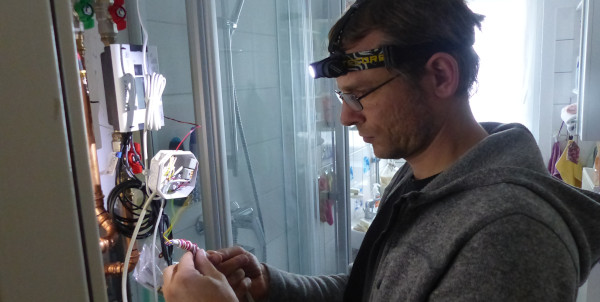
© Passive House Institute |
Does anyone offer higher savings? After a deep retrofit, a typical apartment block from the post-war era has become a model for energy-efficient buildings. The Passive House Institute carried out scien-tific monitoring of the project in Giessen, Germany, and has now published its research report. The retrofit planning in advance using the PHPP tool showed a significant reduction in the heating demand. The measured data shows that indeed, energy consumption for space heating already decreased by over 70 per cent in the first year after the renovation, and even decreased by over 80 per cent by the third year. At the same time, the indoor climate improved noticeably. more |
![]()
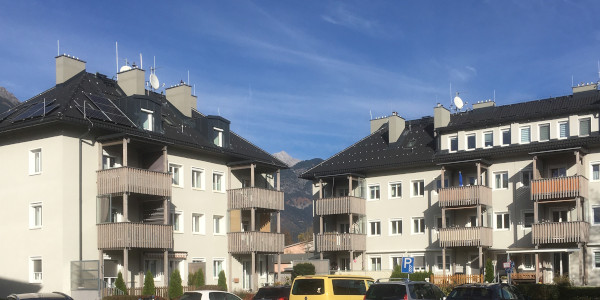
© Passive House Institute |
Emulation highly recommended The EU-funded project SINFONIA has enabled comprehensive energy retrofits to be carried out in Innsbruck in Austria and Bozen in Italy. The heating energy savings are substantial, with an average of 77 per-cent saved in the projects in Innsbruck. At the same time, the building retrofits now offer significantly greater thermal comfort. SINFONIA has thus provided proof of the enormous potential of deep retrofits for saving energy and protecting the climate. These insights will be transferred to other cities in Europe. The Passive House Institute presented 13 certificates in Inns-bruck confirming the high level of energy efficiency of the retrofitted projects. more |
![]()
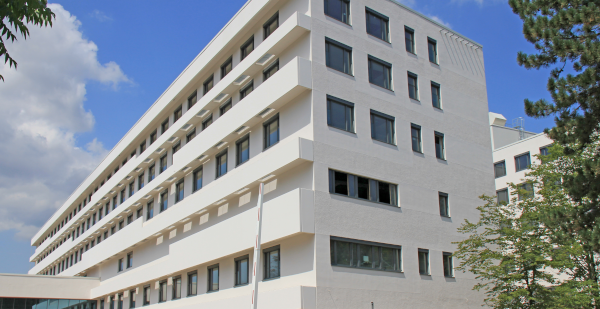
Picture above: Klinikum Frankfurt Höchst |
Hospital 3.0: modern and energy-efficient This modern and climate-friendly hospital in Germany truly is part of a new generation. The new building of the Klinikum Frankfurt Höchst has been successfully implemented to meet the Passive House standard. This makes it the first hospital in the world to receive a Passive House certificate. The Minister of Economic Affairs praised the building for its energy-efficient performance which far surpasses the statutory requirements. The Passive House Institute had previously prepared a baseline study for this pilot project on behalf of the state government of Hesse. The research institute accompanied the new build. more |
![]()
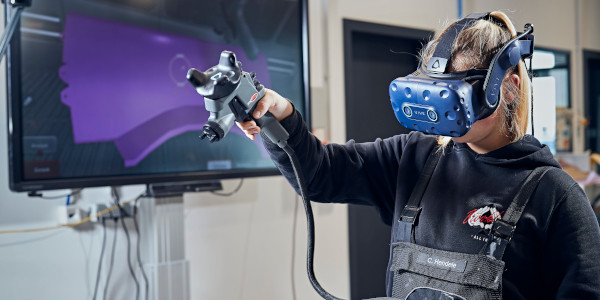
Picture above: Bibb / Rothbrust |
"A Passive House Masterpiece" This campus sets new standards: trainees acquire skills in modern workshops in a highly climate-friendly building. In a first for Germany, the Chamber of Crafts of the city of Trier has built its new training centre to the Passive House standard. It has now been awarded the Passive House certificate. The state prime minister commended this highly efficient new build a "Passive House Masterpiece". The campus has drawn attention nationwide. more |
![]()
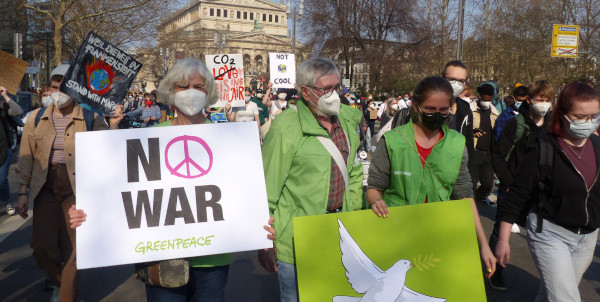
Picture / graphic: Passive House Institute |
Let's save fossil energy! NOW! The call of the hour is to save fossil energy. To achieve this goal quickly, the Passive House Institute has started the #EfficiencyNOW campaign. The research institute explains how each one of us can contribute towards becoming more independent of fossil energy, and ultimately phasing it out altogether. On Passipedia, the Institute provides guidelines on how to go about this. more |
![]()

Picture above: Pixabay |
Happy Birthday, Passive House! Passive House is celebrating its 30th birthday this year! Starting as an experiment, great credit can be given to this pioneering project by Professor Wolfgang Feist: at a time when only very few people thought about climate protection, it paved the way for energy efficiency in buildings. Today, the Passive House Standard has been implemented throughout the world and shines particularly brightly in beacon projects globally. More reasons for celebrating: the 25th anniversary of the Passive House Institute and the jubilee edition of the International Passive House Conference. more |
![]()
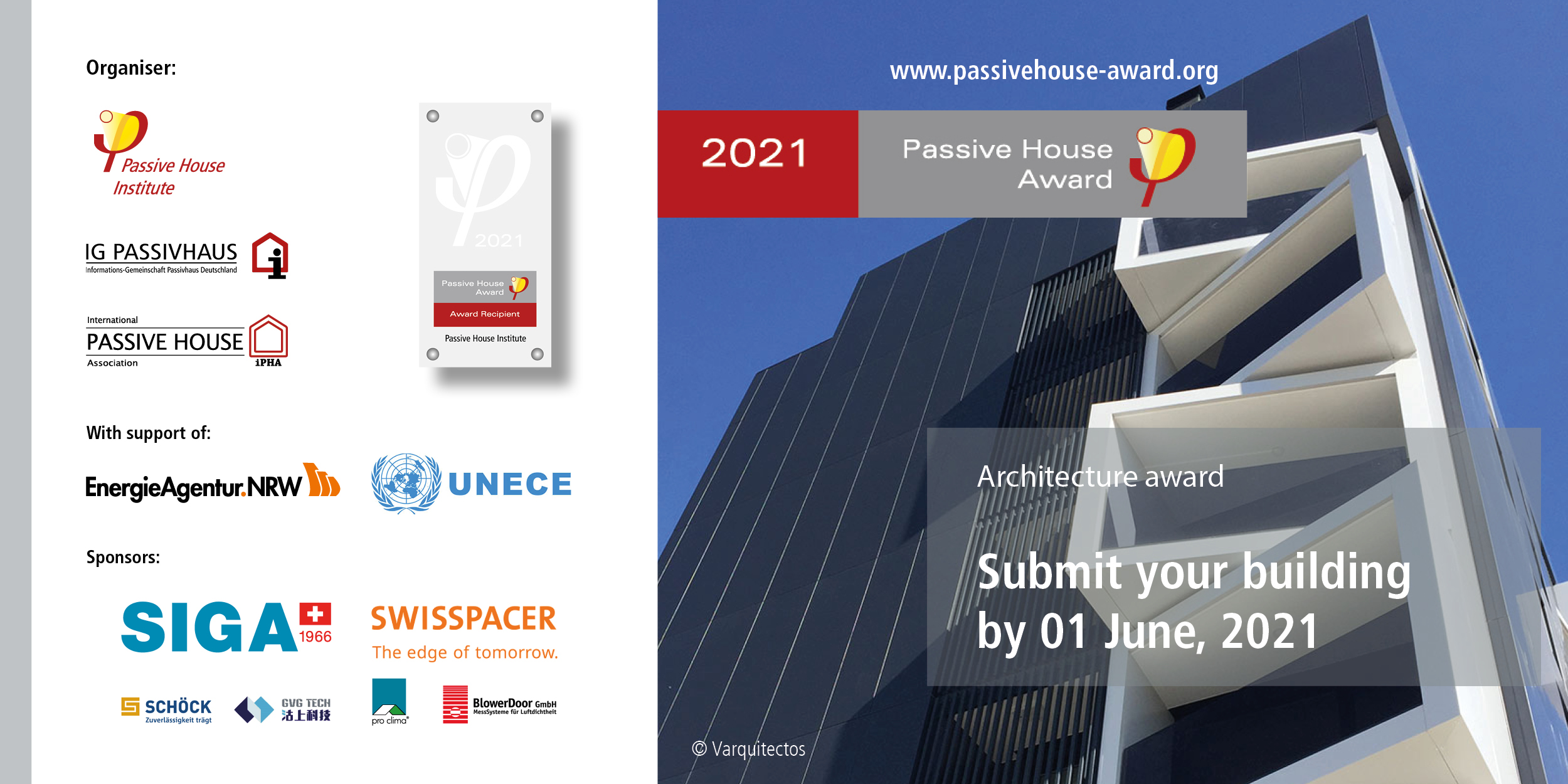
Graphic:: Passive House Institute Picture small: Varquitectos |
Course of action: Passive House The Passive House Institute has announced the Passive House Award 2021 which highlights pioneering projects of energy efficient construction. Special consideration will be given to the renewable energy supply of the buildings by an international panel of judges. Quality assurance of the building through certification is a prerequisite for participation in the Passive House Award 2021. The award will be presented during the 25th International Passive House Conference in September which will be held in Wuppertal and online. more |
![]()
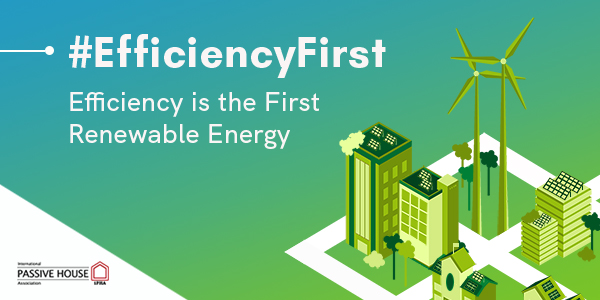
Graphics: iPHA |
Efficiency: The first renewable energy The International Passive House Association and its partner organisations launch the global "Efficiency: The First Renewable Energy" campaign today. Using the hashtag #EfficiencyFirst, the campaign aims to raise awareness for the vital role energy efficiency in buildings plays in meeting our climate goals. The campaign also demon-strates that energy efficient buildings provide a comfortable, healthy and sustainable built environment. The launch includes a competition for social media followers. more |
![]()
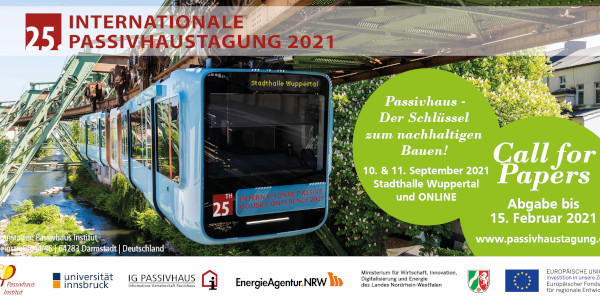
Graphic: Passive House Institute |
The key to a healthy climate The 25th International Passive House Conference will take place from September 10-11th in Wuppertal, Germany, under the patronage of Andreas Pinkwart, North Rhine Westphalia's State Minister for Economic Affairs. Only buildings with a low energy demand for heating and cooling will put us on the path to efficient climate protection. By reducing the energy demand, we can ensure that our building stock's energy needs can be fully met by renewable energy sources, long term and at large scale. Encompassing this idea is this year's International Passive House Conference and complementary exhibition, which bare the motto "Passive House - The key to sustainable buildings!". more |
![]()
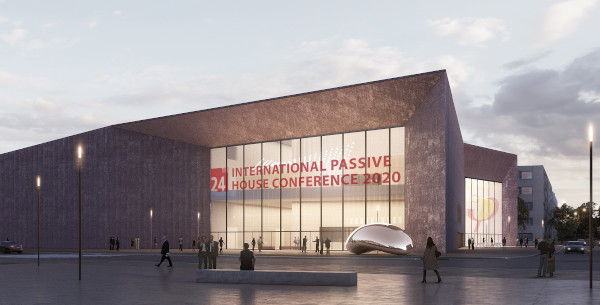
Rendering: Degelo Architects |
Pointing the way – then and now Construction of the first Passive House in the world started 30 years ago in Darmstadt, Germany. The building physicist Wolfgang Feist had developed the Passive House standard prior to this. In the autumn of 1990, he started putting theory into practice with the construction of the private terraced housing complex. Since then, countless buildings have been built to the climate-friendly Passive House standard around the globe. Current projects and research findings will be presented at the 24th International Passive House Conference from 20 September until 8 October 2020. The Passive House Institute presents ten reasons for attending the online conference. more |
![]()

Photo above: Klinikum Frankfurt Höchst |
Hospital a step closer to certification The world's first Passive House hospital, currently being built in Frankfurt, Germany, is a step closer to certification: an airtightness test for the building, which spans 78,000 square metres of gross floor area, was extremely successful. The Passive House Institute in Darmstadt has been consulting on this pilot project right from the start, including the initial planning phase. It has now been tasked with the certification of the project. A baseline study on the implementation of the Passive House standard in hospitals was carried out in advance by the Passive House Institute on behalf of the German Federal State of Hesse. more |
![]()
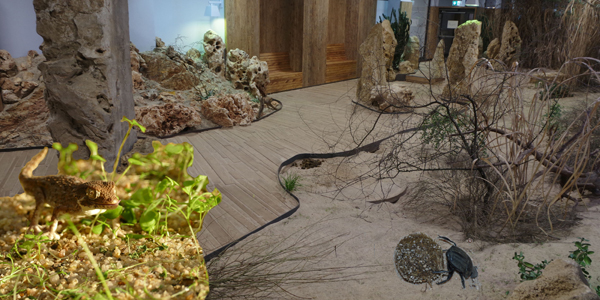
Photos above: Tiergarten Nürnberg, Montage: PHI |
Even zoos can be built sustainably! Registration is now open for the 24th International Passive House Conference with the focal theme "Passive House – Building the future – Sustainably!" The renowned climate scientist Professor Stefan Rahmstorf will give a speech during the opening plenary of the conference, which will begin on 20 September 2020 and is being offered as an online event for the first time. Over the subsequent three weeks, expert talks will be held online two days per week. The conference will come to a close on 8 October 2020. The detailed conference programme is available on the conference website now; the early bird discount will apply until |
![]()
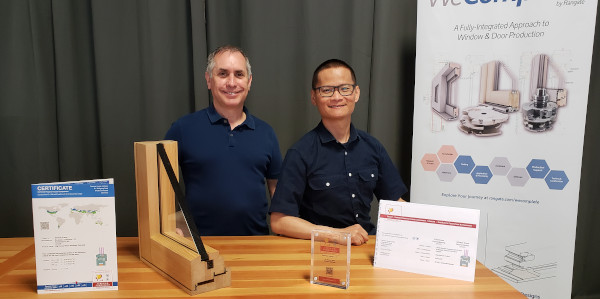
Photo big: Rangate |
Congratulations for the 1000th certificate Another success story from the world of energy efficient construction and renovation: the Passive House Institute has recently issued the 1000th certificate for a Passive House component. There is a great range of quality approved building components now available, and many manufacturers have recognised the potential of certified components for energy efficient buildings. Things looked completely different almost thirty years ago when the first Passive House building in the world was being constructed: the building owners had to specially commission the triple-glazing units and the matching windows from a skeptical carpenter. more |
![]()
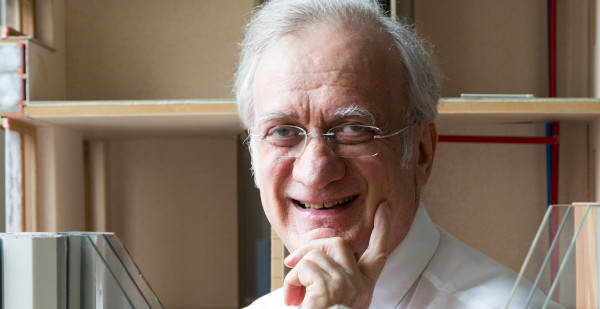
Photo big: Peter Cook |
"We can still do it!" Professor Wolfgang Feist opened with a clear message: "We can still halt the climate crisis. To do so, we need to make the right decisions now and then act upon them." The founder of the Passive House Institute also highlighted the parallels between the COVID-19 and the climate crises. In addition, Feist explained how improved energy efficiency in buildings and a significant change in the areas of mobility and energy could limit the extent of dangerous climate change. "Business as usual is not an option." more |
![]()
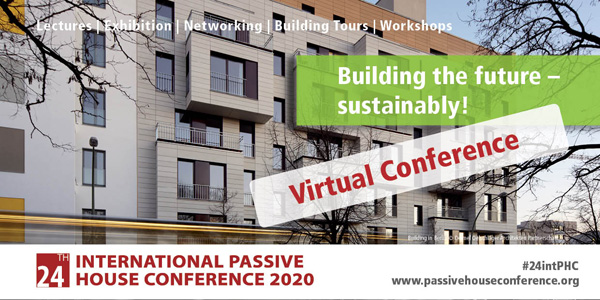
Photo big: Andrea Kroth/Passive House Institute |
New first for International Passive House Conference The 24th International Passive House Conference, planned to take place in Berlin in September this year, will now be offered as a comprehensive online conference. Presentations, workshops, the specialists’ exhibition and building tours that have always been a part of the annual Passive House Conference will remain in the programme. Virtual networking between participants will also be a highlight. more |
![]()
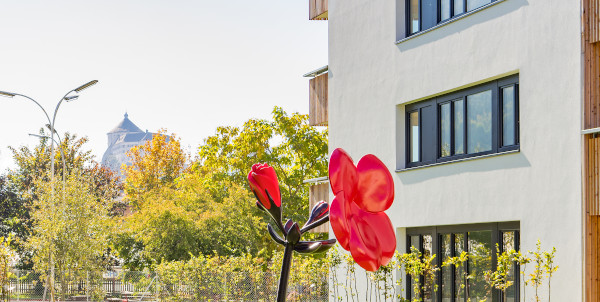
Photo big: Neue Heimat Tirol |
The effort is definitely worth it! Low operational costs for heating and electricity and a high standard of living comfort are possible at the same time: the latest session of the Research Group for cost-effective Passive Houses addressed the issue of social housing and how it can be implemented in a cost-effective and energy efficient manner. During an associated excursion, many participants visited the PassivhausSozialPlus in Darmstadt which is a nationwide model project for social housing. more |
![]()
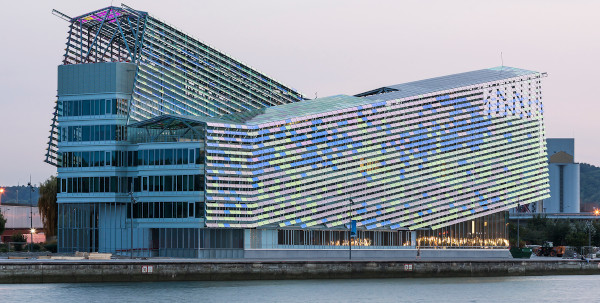
Photo big: Metropole Rouen, architect Ferrier Marchetti Studio |
Passive House buildings lead the way The Passive House Institute in Darmstadt has announced the Passive House Award 2020 to reward pioneering projects in the field of energy efficient construction. A special focus of the competition will be on integrated renewable energy supply. An international jury panel will select the award winners. The award ceremony will take place during the 24th International Passive House Conference in Berlin. more |
![]()
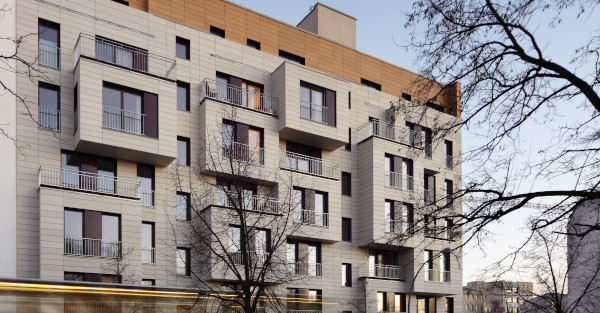
Photo big: Andrea Kroth |
Better homes with less energy Saving energy is comparatively easy in the case of buildings: these can be built so that they will not use much energy in the first place. If renewable energy is added to the mix, then sustainability is optimally implemented: "Building the future – sustainably!", this is the focal theme of the 24th International Passive House Conference 2020 in Berlin. The German Federal Ministry of Economics has assumed patronage for the conference. The call for papers has begun. more |
![]()
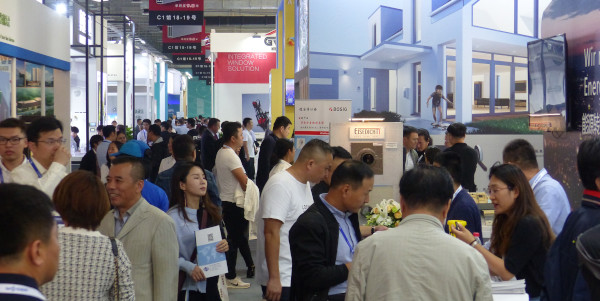
Photos: Passive House Institute |
"1.5 degrees are still possible!" All the keynote speakers at the 23rd International Passive House Conference in Gaobeidian unanimously agreed that putting "energy-efficiency first" was necessary to achieve the climate objectives of the Paris Agreement. For the first time, the Passive House Institute held its annual Conference in China and was a complete success. At the close of the Conference, the Institute in Darmstadt announced the "2020 Passive House Award"; the award ceremony for this architecture prize will take place in Berlin. more |
![]()
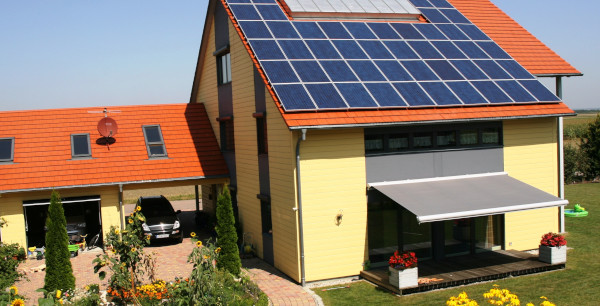
Photo above: Augsburger Holzhaus |
Climate protection combined with comfort More climate protection in the building section is also one of the demands made by the climate activists of Fridays for Future. Extremely energy efficient buildings are part of the solution for more climate protection. Visitors will soon be able to experience first-hand, how little energy is actually required in Passive House buildings: Passive House residents around the world will be inviting the public into their homes during the Passive House Open Days from 8 till 10 November 2019. more |
![]()
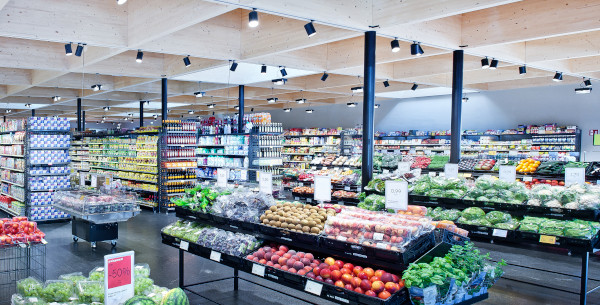
Photo above: MPREIS; K. Auer |
A new addition: energy efficiency! The two buildings are used completely differently, but they have one important thing in common: both buildings have achieved the EnerPHit standard after an energy retrofit. The Passive House Institute recently presented the certificate for the EnerPHit retrofit of a supermarket in the Austrian town of Prutz. About 7800 kilometres away, a clothing factory in Sri Lanka also received a certificate for a successful energy efficient modernisation. This pilot project in the tropical climate will be presented in October at the 23rd International Passive House Conference in China. more |
![]()
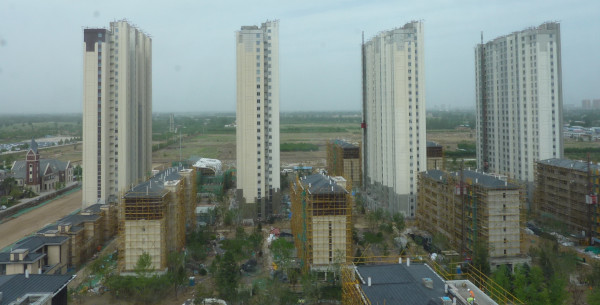
Photo above: Passive House Institute |
China aims for high energy efficiency China is building on a vast scale. This fact becomes apparent in Gaobeidian, a city about a hundred kilometres south of the capital, Beijing. Here, the Passive House district Bahnstadt with over 20 high-rise buildings and many multi-family houses is currently under construction. This is where the Passive House Institute, together with its partners, is inviting everyone to attend the 23rd International Passive House Conference. The theme: "Passive House worldwide". The Conference Programme is online, registration is now possible. The Passive House Institute offers a service webinar for questions regarding the conference. more |
![]()
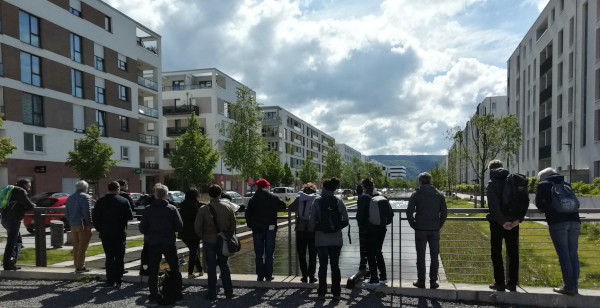
Photos: Passive House Institute |
"Time to think of the national economy" The measuring device showed more than 84 decibels! It was clear that the story about the improvised Blower-Door test in Kazakhstan was the winner of the first-ever Passive House Slam at the Passive House Conference in Heidelberg. The mayor of Walldorf received the most applause during an earlier panel discussion. Mayor Christiane Staab demanded that for climate protection and society in general it was necessary to think in terms of the national economy rather than business economics. At the conclusion, Dr Wolfgang Feist invited the participants to the 23rd International Passive House Conference in China in October. He also revealed the city that will host the 2020 Conference. more |
![]()
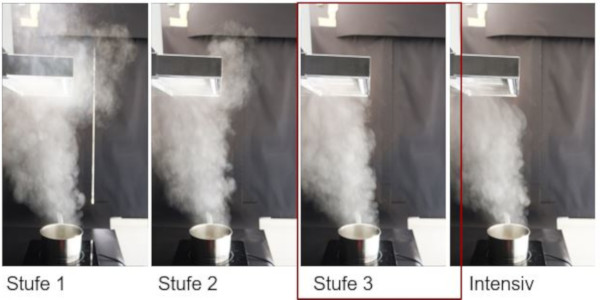
Photo above: PHI |
Plenty of steam around extractors In a new study, the Passive House Institute focuses on systems for vapour extractors, with the research report also resulting in a handbook for extractor hoods in Passive House buildings. This contains the key principles for a compatible system and its dimensioning. The study is now available as a free download. Research findings will be presented during the 23rd International Passive House Conference in China in autumn 2019. more |
![]()
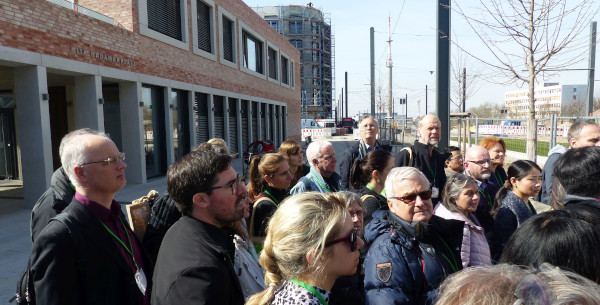
Photos: Passive House Institute |
Heidelberg is already building better Heidelberg doesn't only have a beautiful historic city centre, it also boasts new urban areas that are worth seeing. The Bahnstadt in particular is striking: it is the largest Passive House district in the world. This makes Heidelberg an ideal venue for the Passive House conference "Achieve Better Buildings!". Besides expert talks and practical workshops, the Passive House Institute will also offer many new features in Heidelberg. In addition, there will be special offers for participating municipalities and housing associations. more |
![]()

Photos: Passive House Institute |
Swimming with a clear conscience Swimming pools constructed to the highly energy efficient Passive House Standard can help relieve the burden on municipalities significantly in the long term. This is demonstrated by two Passive House indoor swimming pools in Bamberg and Lünen (Germany), for which the Passive House Institute provided consultancy services. The Passive House Institute evaluated the pilot projects and has published recommendations in a free handbook for planning of energy efficient pools. The handbook is also helpful for optimised operation of already existing pools. more |
![]()
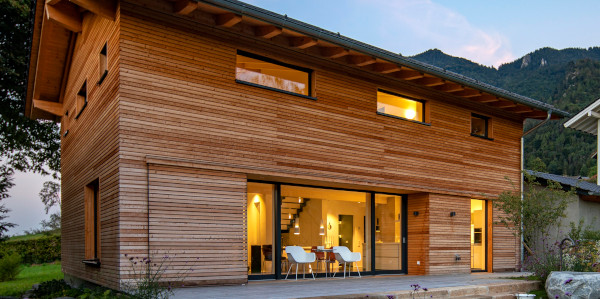
Photo above: Lebensraum Holz: Photo small: PHI |
Welcome to Passive House! Simply walking into other people's homes? That is exactly what everyone can do during the International Passive House Open Days. Residents of Passive House buildings will open their doors to visitors during this annual open days event. They invite them to experience the high levels of comfort and energy efficiency for themselves. Welcome to Passive House! This year the International Passive House Open Days will take place from 9th to 11th November. more |
![]()
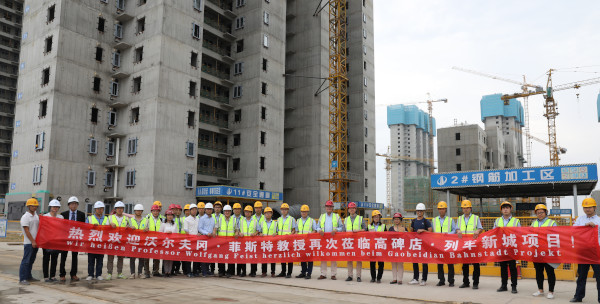
Photo: Longfor |
China commits to climate protection The largest Passive House residential district in the world is currently under construction in the Chinese city of Gaobeidian. Joined by other success stories such as "Bolueta" in the Spanish city of Bilbao, home of the world's tallest Passive House high-rise building, and the first certified Passive House hospital being built in Frankfurt am Main, Germany. The 23rd International Passive House Conference will reflect this global upswing in energy efficient construction. The organisers of the 2019 Conference invite all Passive House enthusiasts to join them in China. The call for papers is now open until December. more |
![]()
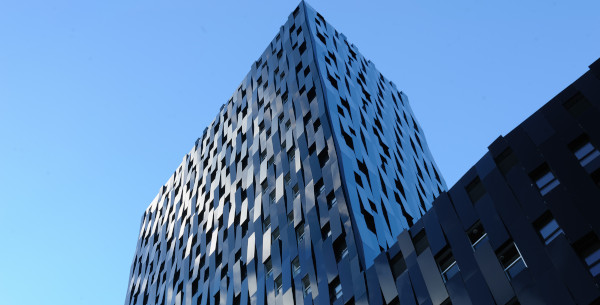
Photo above: Varquitectos |
High-rise Bolueta ranks first The developers and architects had set very high goals. With the Bolueta building they wanted to set a new Passive House record and at the same time ensure the quality of the building through certification. The project participants have successfully achieved both objectives. With a height of 88 metres, Bolueta in the Spanish city of Bilbao is now the tallest Passive House building in the world. The recently issued certificate is proof of its highly energy efficient Passive House Standard construction. more |
![]()

Photo above: PHI |
Passive Houses: cooler inside during summer heat! On hot summer days, Passive House buildings can be noticeably cooler than conventional buildings. The excellent level of thermal insulation keeps the heat out, coupled with effective strategies such as "passive night cooling" ensure comfort in the summer months. Providing proof of a pleasant indoor climate in summer is also one of the requirements for quality assurance for Passive House certification. "Numerous practical examples in different climate zones very clearly show that Passive House buildings have a pleasant and cool indoor climate during heat waves. However, professional planning is crucial for this", says Zeno Bastian of the Passive House Institute. more |
![]()
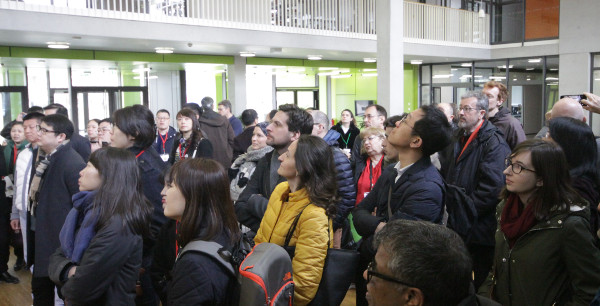
Photo below: PHI |
"There's no alternative to Passive House!" The speakers in the packed hall in Munich were unanimously clear on one thing: that the increase in construction costs in recent years was not caused by energy efficiency; instead, other parameters were responsible. In line with the theme of the 22nd International Passive House Conference "Passive House – it's worth it!" numerous speakers drew attention to the economic feasibility and affordability of energy efficient construction and retrofitting. Tthe 23rd International Passive House Conference in 2019 will be held in China. more |
![]()
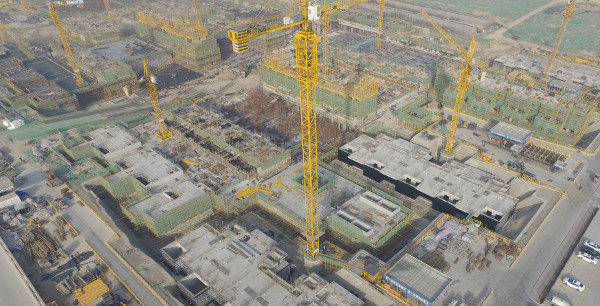
Photo above: Longfor |
Passive House Conference in 2019 in China The next International Passive House Conference is to be held in China. Energy efficient construction and retrofitting experts will convene in the Chinese city of Gaobeidian. This will be the first time that the renowned Conference will be held outside of Europe. "We are aware that this decision may be surprising to some. However, it is in China where the most construction activities are currently taking place," explains Professor Wolfgang Feist. In addition, in Heidelberg, Germany, the "Achieve better buildings" Conference will take place next year. more |
![]()
Photos: Klinikum Frankfurt Hoechst |
Passive House hospital progressing The world's first hospital designed to the Passive House Standard is currently under construction in the Frankfurt district of Hoechst. The hospital's building shell has already been completed, now the interior finishing is underway. The construction of this highly energy efficient hospital should be completed by next year. The Passive House Institute in Darmstadt has been advising on the project since the design phase and will continue with its consultancy services throughout the entire duration of construction work. more |
![]()
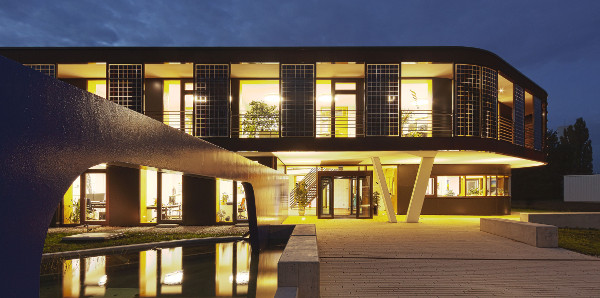
Photos: Jakob Kanzleiter |
Munich shows its efficient side Munich has many great examples of climate-friendly construction projects and residential districts. These projects are setting new energy efficiency and community life standards at affordable prices! The 22nd Passive House Conference in Munich will provide insights into these unique and surprising residential projects. The main topic of the upcoming conference "Passive House – it's worth it", puts a special focus on aligning economic viability with energy efficiency. more |
![]()
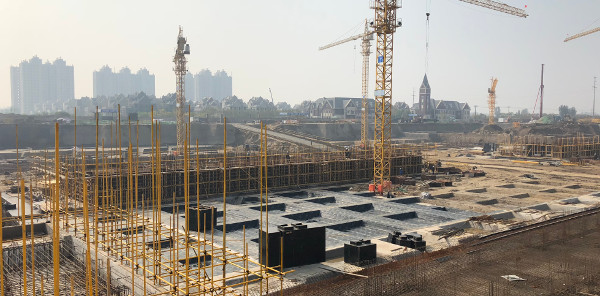
Photo above: Luther Design |
COP23 is also about Passive House The world climate conference in Bonn is an internationally recognised event; after all, it is about global climate protection. The UN has expressly mentioned Passive House buildings as a way to achieve significant energy savings in the building sector. The Passive House Institute from Darmstadt is also on the ground at the COP23 in Bonn. In addition, a delegation will be visiting a new Passive House student residence during the conference. As part of the Passive House Open Days, taking place at the same time as the climate conference, the opportunity to visit the student residence in Bonn will also be open to interested members of the public. more |
![]()
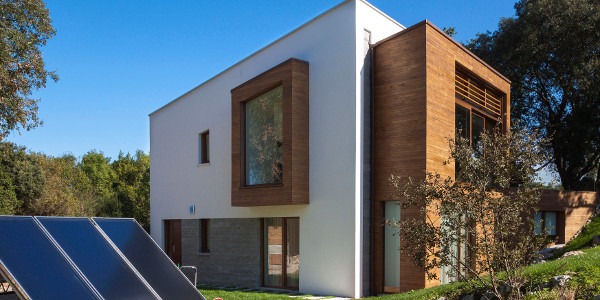
Photo above: Carmen Delgado Photo below: Andrew Michler |
It's definitely worth it! Passive House buildings are particularly efficient buildings and are always a theme in any discussion relating to energy efficiency. What this building standard specifically entails can be experienced first-hand by everyone during the International Passive House Open Days in November. How low are the heating costs in a Passive House? And what does better living comfort feel like? From 10 - 12 November 2017, residents of Passive House buildings throughout the world will open their doors to the public. A list of buildings that are open for viewing can be found on the Internet. more |
![]()
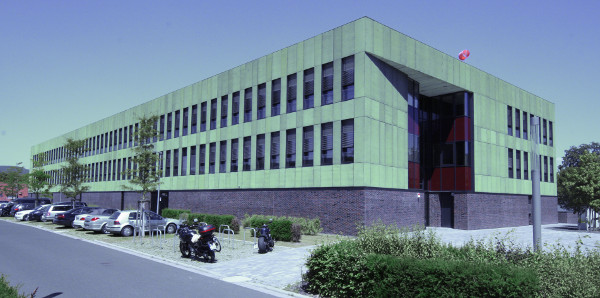
Photos: Passive House Institute |
Police set examle for climate protection With the completion of the new police administrative building, the German state of Hesse has shown how energy efficient construction works. The administrative building in Baunatal in northern Hesse contributes significantly to a reduction in the energy consumption of government buildings in the province of Hesse and thus promotes climate protection. This is one of the numerous outcomes of the monitoring carried out by the Passive House Institute on behalf of the Ministry of Economic Affairs in Hesse. more |
![]()
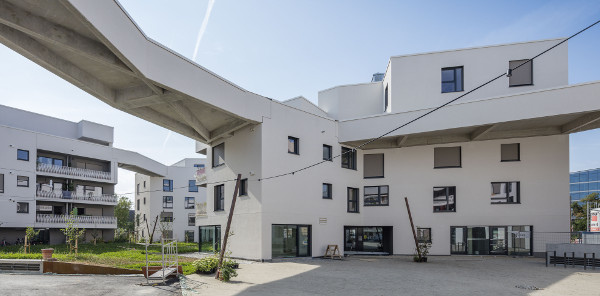
Photo above: Michael Heinrich Photo below: Herz & Lang |
Affordable and energy efficient! In view of the international climate objectives, providing both affordable and energy efficient living space has become a challenging task for cities and communities. Solutions for solving this dilemma will be discussed at the 22nd International Passive House Conference which will take place on 9 and 10 March 2018 in Munich. "Passive House – it's worth it!" is the motto of this year's Conference, which will be introducing many low-cost projects relating to energy efficient construction to the Passive House Standard. The Call for Papers has begun. more |
![]()
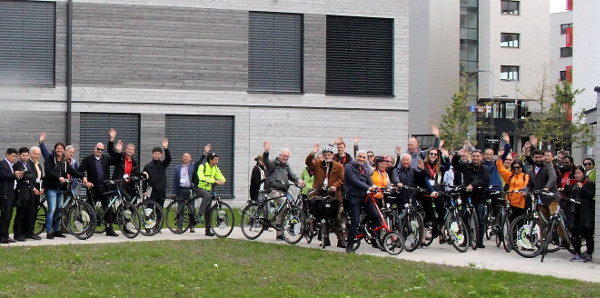
Photos: Passive House Austria |
"You just have to use your head" Changing habits requires us to think, and it isn't easy. That's what the participants of the 21st International Passive House Conference in Vienna were challenged with during the opening plenary. Breaking old habits and sharing resources fairly is necessary in order to reduce climate change to a tolerable level, as renowned climate researcher Helga Kromp-Kolb explained. "We have to manage with just this planet", pointed out Professor Dr. Wolfgang Feist, Director of the Passive House Institute. Over 1000 participants from more than 50 countries travelled to Vienna in order to exchange information relating to energy efficient construction and learn more about international Passive House projects. more |
![]()
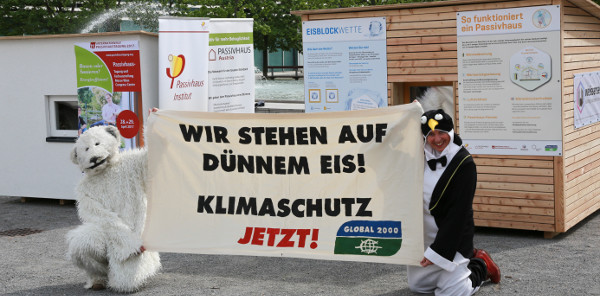
Photo above: Passivhaus Austria |
Polar bear lands a hand to climate protection At present people passing by the Messe Wien Congress Center in Vienna can see for themselves how important energy efficient buildings are for climate protection. The Passive House Institute, together with the Passivhaus Austria network, GLOBAL 2000 as well as the campaign MOTHER EARTH, has built two different mini houses for the ice block competition, a mini Passive House and a conventional mini house. A 250 kilo block of ice has been placed in each mini house. The question is, how much ice exactly will still remain in both houses after six weeks. Estimates can be submitted online. more |
![]()
Photo above: PHI |
"Of course we open the windows!" Wolfgang Erichson has been living in the Bahnstadt district of Heidelberg for three years and is very happy with his new place of residence. "It was pleasantly warm even on cold winter days," says Erichson. On the fire station premises the city administration presented its energy monitoring results together with the Passive House Institute. The two most important outcomes: the consumption of heating energy in the Bahnstadt district was extremely low. Simultaneously, the total energy consumption was only a third of that of conventional housing complexes. more |
![]()
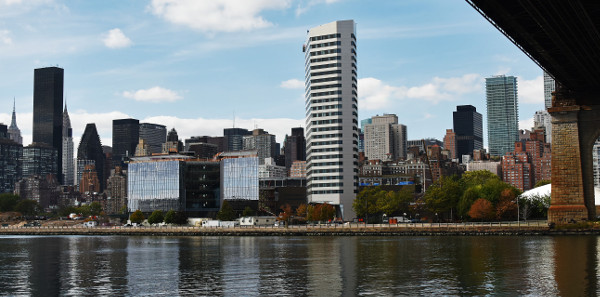
Photo above: New York, M. Onder |
Aiming high When it was inaugurated four years ago, the Raiffeisen Tower in Vienna was the first high-rise building in the world built to the Passive House Standard. Four years later, great progress has been made. This summer, in New York, around 350 students will move into a 26-storey dormitory, being built to the Passive House Standard. The structure of the 88 metre tall Passive House building "Bolueta" in Bilbao, Spain, will be completed within a few weeks. The architects of both these buildings will attend the 21st International Passive House Conference in April in Vienna to report on their exciting projects. more |
![]()
|
Vienna presents energy efficient construction |
![]()
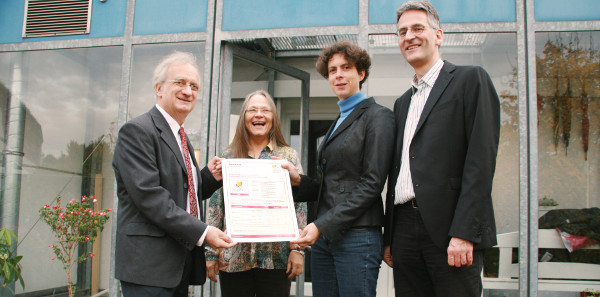
|
Pioneer project upgraded to Passive House Plus |
![]()
|
|
Step-by-step towards EnerPHit |
![]()
|
Photos: Klinikum Frankfurt Höchst |
Operation Passive House Clinic |
![]()
|
|
Photo above: H.Dimko |
From kindergartens to retirement homes The Passive House Institute is looking forward to Vienna where the 21st International Passive House Conference will be taking place next year. The date and venue for the Conference have now been confirmed: experts in energy efficient construction will convene at the Messe Wien Congress Centre on the 28th and 29th April 2017. The theme for the 21st Conference will be "Passive House for all". The Call for Papers has begun. www.passivehouseconference.org // more |
![]()
News in brief
|
|
Smiling faces in Aberdeen |
![]()
Press releases
|
Passive House Institute joins NAPHN in New York for annual conference |
|
|
Passive House Conference presents solutions for buildings of the future The Passive House Standard combines maximum efficiency with optimal comfort. How this works, was demonstrated by experts from all over the world on 22 and 23 April during the International Passive House Conference in Darmstadt. This event also marked an anniversary: 25 years ago, the world's first Passive House building was built just a few kilometres away from the congress centre – and a brand new study, presented at the Conference, proves the sustainability of the concept. more |
|
|
New database provides overview of Passive House components Whether just browsing or to find a specific product – a new online database provides a detailed overview of components for Passive House construction. All |
|
|
"Active for more comfort" - Passive House brochure as online flipbook How does a Passive House work? Which requirements exist with regard to components, planning, design, and project implementation? What is it like to live in a Passive House, what has already been built, and why are Passive Houses such an attractive investment? In order to competently answer such questions, the International Passive House Association (iPHA) has created the informational brochure "Active for more comfort". A new edition of this brochure is now available as an online flipbook. |
|
|
Passive House Institute launches e-learning program With a tablet at home or with a smartphone during the daily commute – a new e-learning program is making basic Passive House training more comfortable than ever before. The video-based online modules are equally suitable as an introduction for laypersons and as preparatory material for courses aimed at certification as a Passive House Designer or Consultant. The individual chapters deal with general questions as well as with specific examples of planning for building services systems and the building envelope. more |
|
|
Designing sustainable buildings made fun: PHPP 9 now available The tried and tested PHPP tool for designing energy efficient buildings is available in a brand-new version. This upgrade not only allows reliable calculation of the energy demand in accordance with internationally applicable criteria. It takes into account energy generation on or near the building as well. The new features also include innovative options, for example for heat recovery from shower water or for profitability calculations. The practical use of the tool is facilitated by means of automatic verification and plausibility checks. more |
|
|
Component Award for exemplary ventilation concepts for retrofits The winners of the Component Award 2016 for ventilation solutions in residential buildings have been selected. The first prize goes to a concept by the Austrian manufacturer Pichler. A joint second prize will be granted to Vaventis and Michael Tribus Architecture. The approaches for building retrofits selected by a jury are not only characterised by a high level of energy efficiency, but also by their economic viability. The presentation of the Award took place at the 20th International Passive House Conference. more |
|
|
New Passive House office building in Frankfurt now certified Curved façades, but a straightforward energy concept: a new office building in Frankfurt, Germany, clearly shows the potential of sustainable building design, with an architectural style that is not only elegant but also intelligent. The result is a 90 percent reduced heating demand and perceptibly increased comfort due to high indoor air quality. The building thus meets with the criteria for the Passive House Standard. Details were discussed during excursions as part of the International Passive House Conference 2016. more |
|
|
World's first Passive House Premium now certified One of the world's most sustainable buildings stands in Bavaria: as the first of its kind, a mixed residential and commercial project in the town of Kaufbeuren has met the criteria for a Passive House Premium certification. With a heating demand of only 8 kWh/m²a, it is uniquely energy efficient. At the same time, a 250 m² photovoltaic system on the roof produces renewable energy. The doors of this new building were open to the public on 14 and 15 November within the framework of the international Passive House Days 2015. more |
|
|
World's largest building retrofitted to EnerPHit Standard now certified A completely modernized university building in Innsbruck, Austria demonstrates the energy saving potential available with refurbishments. Through integrated planning, the heating demand of the building was reduced from 180 kWh/m²a to just 21 kWh/m²a. The project thus meets the criteria of the EnerPHit Standard for retrofits with Passive House components – this standard, introduced by the Passive House Institute, is specially tailored to the particularities of retrofit projects. The certificate was presented at the official reopening. more |
|
|
New study shows cost saving potential for indoor swimming pools Passive House efficiency is a model for the future also for indoor swimming pools. This is demonstrated in a new report on the energy consumption in the "Bambados" in Germany. The running costs for this leisure pool are far below average. The concept is thus successfully providing an opportunity for financial savings, especially relevant for municipalities with limited budgets. The full report is now available online (in German). Further details were presented at the International Passive House Conference in 2016 in Darmstadt. more |
|
|
Monitoring confirms energy efficiency of Passive House city district The Passive House district of Bahnstadt in Heidelberg (Germany) has passed the test: according to a report on recent measurements, the values being strived for in relation to energy efficiency were met in full. In 2014, the average consumption of 1260 housing units with a living area of more than 75 000 m² was 14.9 kWh/(m²a). The statistically high number of projects built by different property developers and architects convincingly shows that a successful large- scale implementation of the Passive House Standard is possible. more |
|
|
New architecture book presents "Passive House Award" winners A new book showcasing the winners and finalists of the international "Passive House Award" shows that energy efficient construction is not only profitable, it is also an enrichment for architecture. The book is available in a bound version and in digital form as an online flipbook. All of the award-winning buildings are presented with many photographs and illustrations. Technical details which are relevant for the energy balance are also explained in detail. In addition to the book, there is a poster exhibition on the Award. more |
|
|
First multi-unit residential building certified to Passive House Plus The combination of energy efficiency and renewables is the future-proof solution for all buildings, including multi-storey projects – this is demonstrated with a new build in Innsbruck, Austria: the apartment complex is the first of its kind to be certified as a Passive House Plus building. This concept is not just based on a theoretical annual energy balance, which is misleading in practice; instead, the actual amount of regionally and seasonally available renewable energy is taken into account. more |
|
|
New designPH takes Passive House planning to a whole new level Passive House planning has never been more convenient. The new designPH, a 3D model interface developed by the Passive House Institute, allows for graphic input of energy related design data. Details relating to the thermal building envelope and shading are entered automatically and can be optimised if necessary. The treated floor area can be gradually refined in order to simplify the design process. The results can be exported into the Passive House Planning Package (PHPP) with just a few clicks. more / order now |
![]()
For regular Passive House related news please follow the International Passive House Association (iPHA) on
Twitter and Facebook or the Passive House Institute on LinkedIn.
| Next Courses |
PHPP Expert
Passive House Designer / Consultant
Construction Verifier
Site Supervisor
![]() read more
read more
e-learning
| Events |
iPHA Webinar "Project Spotlight: China's first certified Passive House Premium office building" | December 4, 2024
![]() read more
read more
![]() Passive House Open Days |
Passive House Open Days |
7 - 9 November 2025
![]() read more
read more
| Component Database |
 Passive House
Passive House
Component Database
read more
| Projects |
| New developments |
![]() designPH
designPH
read more
![]() NEW: PHPP 10 (2021)
NEW: PHPP 10 (2021)
read more
 Seals for Certified Passive House Components
Seals for Certified Passive House Components
read more
 Passive House Classes,
Passive House Classes,
Classic, Plus, Premium
read more
 EnerPHit -
EnerPHit -
PHI certification for retrofits
read more
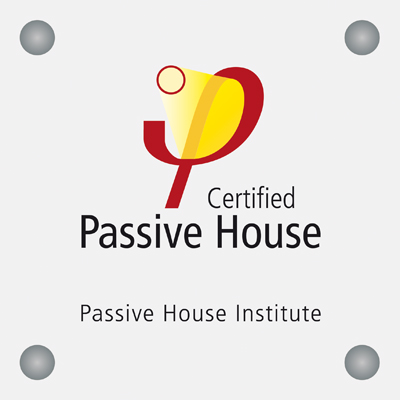 Wall plaque
Wall plaque
for certified Passive Houses
read more
| Press releases |
| Research & Literature |
![]() Passive Houses for different climate zones
Passive Houses for different climate zones
more
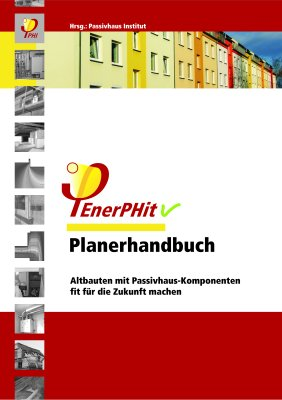 Retrofits with Passive House components -
Retrofits with Passive House components -
EnerPHit Planner Handbook
(in German)
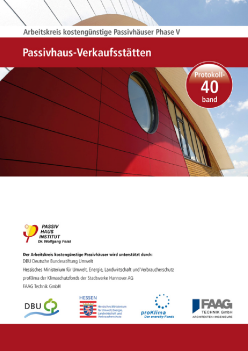 Passive House Retail Stores now out
Passive House Retail Stores now out
Overview of contents
(in German)

